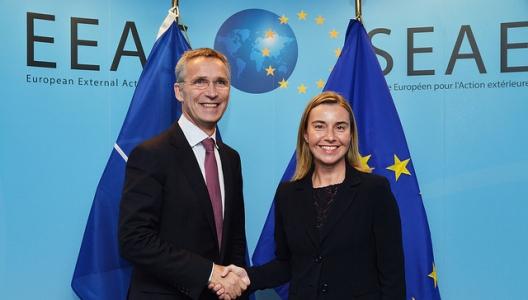 The headquarters of Brussels’ two international bureaucracies lie barely 4 miles apart, but at times in their history the distance between the two has been far greater.
The headquarters of Brussels’ two international bureaucracies lie barely 4 miles apart, but at times in their history the distance between the two has been far greater.
Now, with a new generation of leadership at the North Atlantic Treaty Organization and at the European Union and a challenge for both emerging in the form of a newly assertive Russia, there is new impetus for cooperation between the two over European security. . . .
The EU’s new foreign-policy chief, Federica Mogherini, spent much of Tuesday at a NATO foreign ministers’ meeting. On Wednesday, NATO Secretary-General Jens Stoltenberg visited Donald Tusk, the newly installed president of the European Council, who is charged with guiding the collective agenda of EU governments.
On her second day in office last month, Ms. Mogherini met Mr. Stoltenberg, whom she knows from before they took their current position and whom she described as a “very good friend.” Indeed, the EU’s foreign-policy chief—a post created only in 2009—provides an obvious point of contact for the NATO boss.
“We have a common challenge in front of us: a security environment that is more worrying every day. Cooperation among us should improve. This is the only way of having effective military capabilities on the ground,” Ms. Mogherini said. To this end, Ms. Mogherini and Mr. Tusk, a strong Atlanticist, have started discussing ideas for further cooperation between the EU and NATO, according to one EU official. . . .
Berlin Plus was called upon for EU operations in Macedonia and in Bosnia, where it operates today with the (British) second-in-command at NATO as the overall commander. But since 2004, further such arrangements have been stymied, keeping alive—just—the debate about whether the EU should have its own command-and-control capability.
But there are areas where cooperation may move forward, as outlined by an EU summit in June and NATO’s summit in Wales in September: maritime security (both organizations run antipiracy missions in the Horn of Africa), cyberdefense and helping develop defense capabilities in friendly countries. . . .
It is, however, early days. The political will is there, according to representatives from both sides. But says one senior EU official: “There is no substantial document or paper at this stage” with specific ideas for coordination. As a result, it remains in doubt whether the warm words will have any practical outcome.
Image: Secretary General Jens Stoltenberg and EU High Representative Federica Mogherini, Nov. 4, 2014 (photo: NATO)
